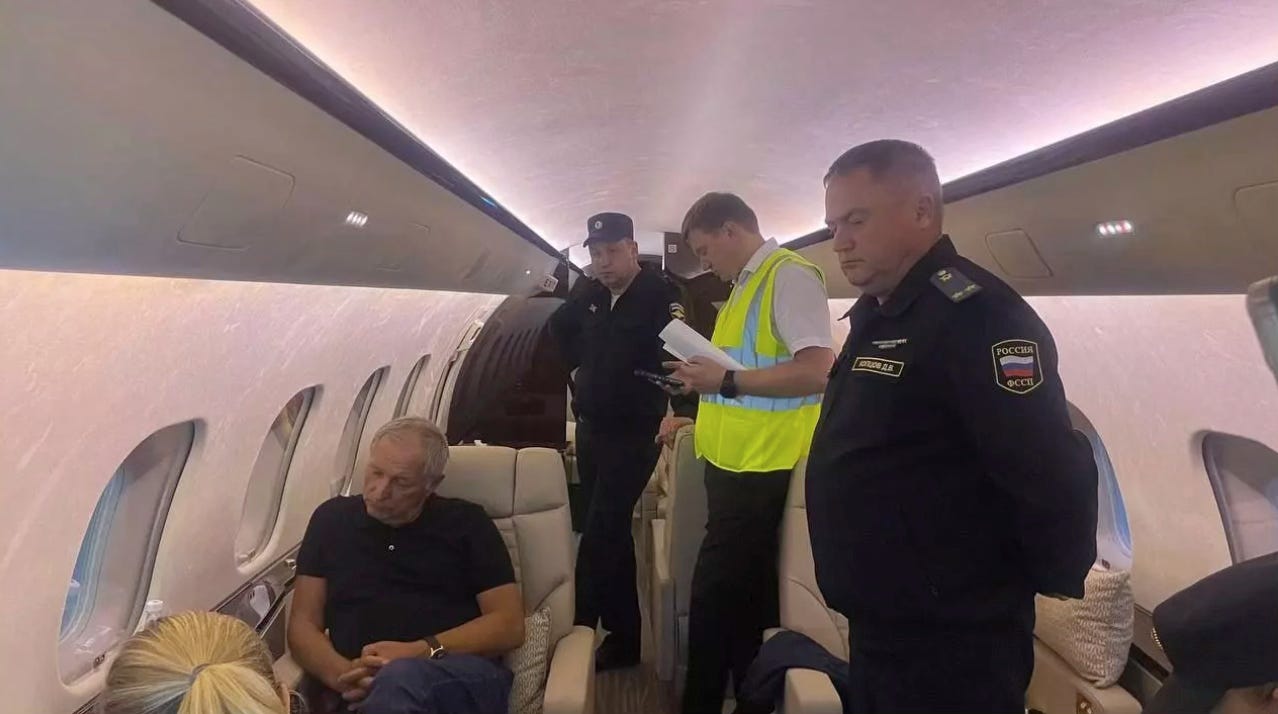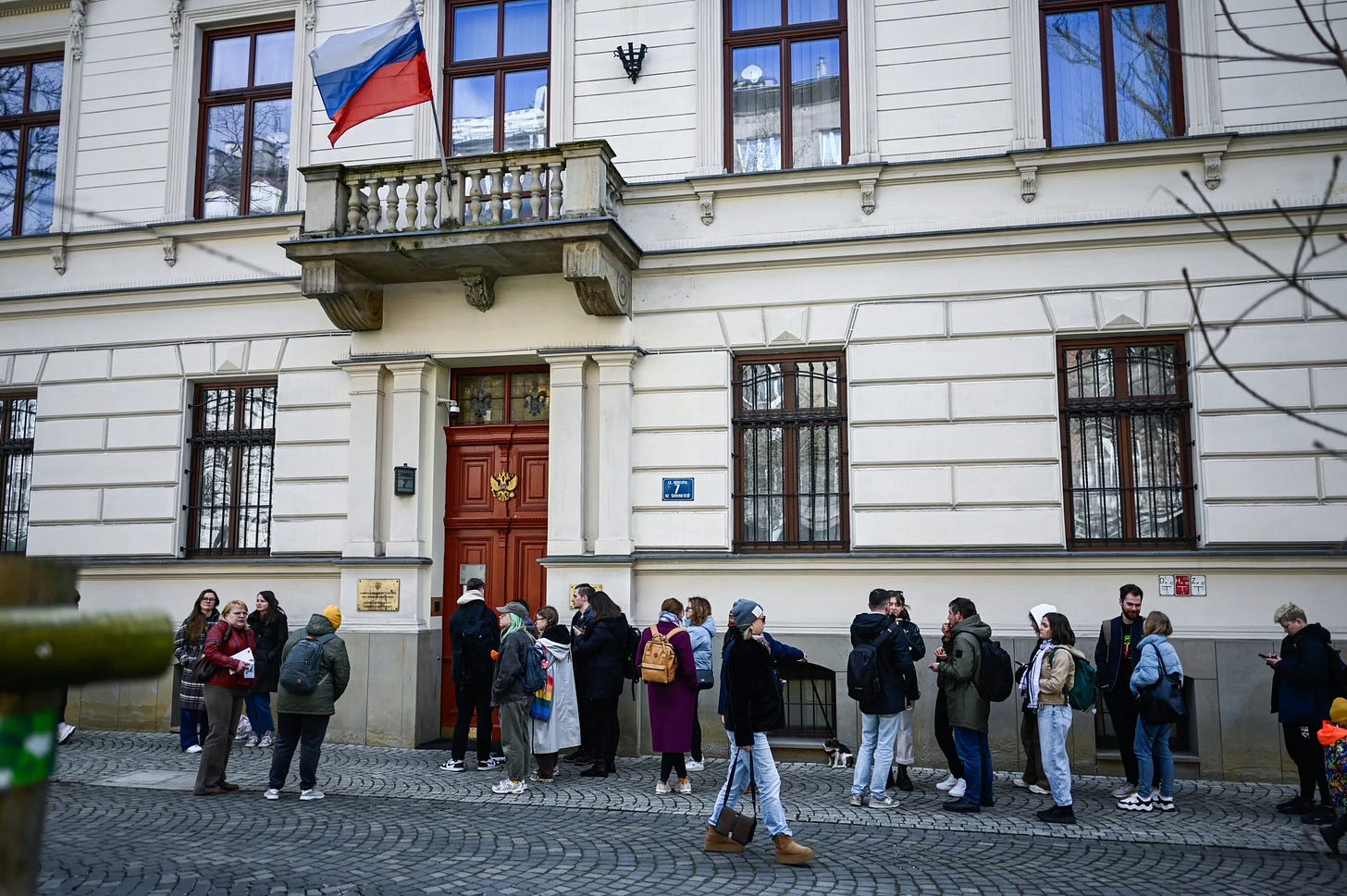BRICS 2025 – A Big Family
Big Happy Family – Not | Conflicting Interests | Searching for Identity
Dear BWR Shoeshiners and Barbers!
IMPORTANT NOTICE: Please be aware that some e-mail servers (G-mail in particular) may truncate the BWR newsletter, thus depriving you of total enjoyment. If this problem occurs, please read BWR on the Substack platform to enjoy the full newsletter.
Follow BWR’s daily posts on the Blue Sky platform for daily updates and posts.
In last week’s BWR, I discussed Russia’s eroding influence with Azerbaijan as a case study of its waning power not only in the South Caucasus but also across its near abroad. Who is benefiting from this decline, and how are the alliances shifting?
In this week’s BWR, I will discuss BRICS+. An expanding organization founded by Russia, China, Brazil, and India continues to seek purpose beyond its members’ shared anti-Western sentiments. Brazil, which holds the 2025 BRICS+ presidency, hosted the 17th summit.
Takeaways
BIG FAMILY TENT—Four of the nine BRICS ‘invitees’ countries are in South America. The spectrum of anti-Western sentiment within BRICS is broad—from Iran to Brazil.
IDENTITY—Sam I am - I am who I am. BRICS is searching for identity. Is it an economic or a political bloc? Is it both? It remains to be seen.
Big Happy Family - Not
BRICS+ has grown from the original five countries—Brazil, Russia, India, China, and South Africa—in 2009 to an organization with eleven members and nine partner countries in 2025. President Vladimir Putin launched the BRIC initiative in 2006, and the 2008 global financial crisis served as the catalyst for its official formation as BRICs (South Africa was added to the group) in Yekaterinburg in 2009.
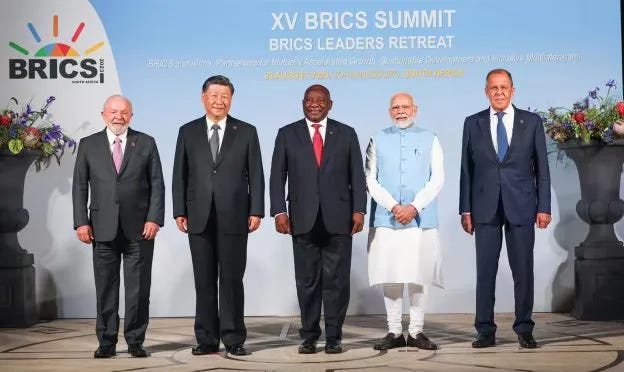
BRICS operates with an annual rotating presidency, and the country holding the presidency sets the agenda for the yearly summit. This year, Brazil is the president, and the theme was
"Strengthening Global South Cooperation for More Inclusive and Sustainable Governance"
For whatever the theme really means, the 17th BRICS summit in Rio de Janeiro last week included its members and partner countries, along with seven of the eight “invitee” countries – Chile, Colombia, Mexico, Uruguay, Saudi Arabia, Türkiye, and Kenya. Although Azerbaijan was formally invited and is a BRICS applicant, it chose not to attend this year.

Although this was a healthy and the largest gathering of BRICS+ members, partner countries, and ‘invitees,’ the absence of President Vladimir Putin and President Xi Jinping was noticeable. Putin did make a brief virtual appearance and was represented by Russian Foreign Minister Sergei Lavrov, and Xi was represented by Chinese Prime Minister Li Qiang.
Putin’s decision to skip the summit is due to the active International Criminal Court (ICC) arrest warrant for him. Brazil is a signatory to the ICC and would be obligated to detain him should he enter the country.
Xi Jinping’s decision to skip the summit was more complex and should be viewed in the context of both domestic and international strategic priorities, as well as his approach to multilateral diplomacy. Domestically, Xi faces a sluggish economy burdened by a worsening real estate crisis and rising youth unemployment. Furthermore, an unpredictable Trump administration continues to issue new tariff threats nearly every week. Trump’s tariffs affect not only China’s U.S. export market but also other markets where China exports its overproduction of electric vehicles (EVs) and steel. For example, Russia, Mexico, and the United Arab Emirates are among China's largest EV export markets, and these are beginning to decline. The EV sales market in Russia has fallen by 57%, and Chinese EVs account for 60% of the Russian market.
Conflicting Interests
As BRICS expands, the risk of conflicting interests also increases. For example, in 2023, Putin actively supported Venezuela’s formal application for BRICS membership; however, Brazilian President Luiz Inácio Lula da Silva blocked the application because he did not recognize Nicolás Maduro’s self-declared presidential election victory and criticized Maduro over the wave of repression he unleashed against political opponents. With Li representing China, Xi maintains Chinese continuity in BRICS+ and avoids potential public disagreements with Indian Prime Minister Narendra Modi. Although the relationship between China and India remains stable, it still contains conflicting interests.
It is worth noting that the BRICS rotating presidency will be held by India in 2026.
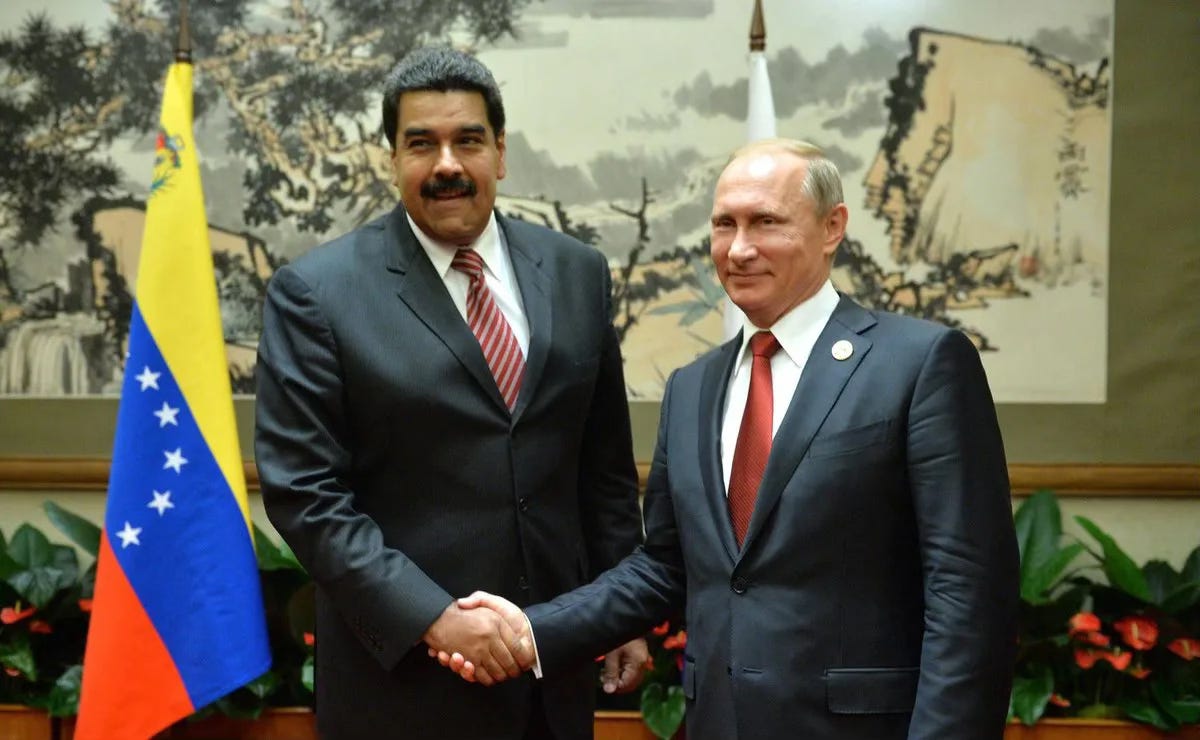
China serves as the BRICS financial underwriter, with Russia serving as the operator. Xi prefers multilateral platforms where China can maintain control and expand its economic influence. For example, China’s relationship with La Comunidad de Estados Latinoamericanos y Caribeños (CELAC), an organization founded in 2010 as an alternative to the Organization of American States (OAS) that includes both Cuba and Nicaragua, is strengthening.

The May 2025 forum in Beijing was marked by tension with the US when Colombian President Gustavo Petro joined his country in China’s Belt and Road Initiative. The Shanghai Cooperation Organization (SCO) is another platform where China advances its interests because it is at the organization’s center. China’s growing influence through the SCO comes at Russia’s expense. Although BRICS remains a crucial global influence platform for both Russia and China, its expansion makes decision-making more complex and weakens the anti-Western unity important to members like Iran, Cuba, and Russia. As the second-largest economy, China still has a lot of skin in at risk in the Western-led global economy. This also applies to India and Brazil.
Searching for Identity and Purpose
A shared goal of BRICS members has been to challenge the current Western-led global economy by reforming it or replacing it with an alternative that ‘better represents the economic and political interests of the global South’. As the organization expands with countries that have a greater vested interest in the success of the existing global economy, the anti-Western sentiment is diluted and an alternative global economy becomes less appealing. As a result, consensus within the organization becomes more difficult and decision-making in the organization is affected.
China serves as the BRICS financial anchor because it is the world's second-largest economy ($15 trillion) and accounts for two-thirds of the bloc’s nominal GDP. China is also the largest trading partner for most BRICS members, including Russia. However, China is not yet in a position to abandon the global economy, especially now that its home economy remains sluggish, because it remains highly interconnected and dependent on the Western-led global economy. This is also true for India and many other new BRICS members and partner countries that have joined. It is not the case for Russia, Iran, Cuba, and others who have been sanctioned out of the global economy and are members of BRICS. Herein lies the problem as BRICS seeks to find its identity and purpose – Is it an economic bloc, a political bloc, or both?
Until BRICS finds its purpose, it will continue to be unhappy in its own way.
Additional Reading(s)
Putin’s BRICS Party in Tatarstan (Russia) (Barbershop Whispers…Russia 27 Oct 2024)
HOW THE US IS HELPING CHINA QUIETLY EXPAND ITS FOOTHOLD IN LATIN AMERICA (Americas Market Intelligence, 01 Jul 2025)
Another BRICS+ in the Wall (Barbershop Whispers…Russia 29 Sep 2024)
The Digital Currency Geneie has Left the Building – BIS Building (Barbershop Whispers…Russia 03 Nov 2024)
Xi Jinping Skips BRICS: A Silent Rebuke of a Fractured Bloc? (Modern Diplomacy 7 Jul 2025)
Joint Declaration of the 17th BRICS+ Summit (BRICS Brasil 2025, 6 JUl 2025)
Alliance of the Aggrieved - Russia and Venezuela (Barbershop Whispers…Russia 20 October 2025)
Four questions (and expert answers) about the China-Latin America summit (Atlantic Council 05 May 2025)
Follow-ups & Quick Bites
Follow-ups
Gold Magnate’s Assets Seized
A court in the Chelyabinsk ordered the nationalization of Yuzhuralzoloto, Russia’s third-largest gold producer, marking the government’s latest wartime seizure of major private assets.
The Prosecutor General’s Office filed a lawsuit to seize the Yuzhuralzoloto Group of Companies (YUGK) from billionaire and regional lawmaker Konstantin Strukov.
Prosecutors allege that Strukov illegally took control of the company using his position in government and transferred ownership to associates and his daughter. His daughter, Alexandra Strukova, holds Swiss citizenship.
Strukov was detained on his private jet as he was preparing to summer in Türkiye.
Since the start of the second invasion of Ukraine, the Kremlin has confiscated or forced discounted sales of nearly $50 billion in private assets. The Rolf Group and Tinkoff Banking services are two recent examples.
We are witnessing a continued redistribution of assets, but the unwritten rules are unclear and causing unease among the elite.
Additional Reading(s)
A Dizzying Fall of a Russian Gold Magnate (France24 09 Jul 2025)
Quick Bites
China Fulfills Russia’s Unkept Promises in Cuba
After a few years of unfulfilled Russian promises of investments in Cuba’s energy sector, China has stepped in to fill the vacuum.
Cuba joined China's Belt and Road Initiative in 2018, and China has since invested in several strategic infrastructure projects on the island, including major projects in transportation, port infrastructure, and telecoms.
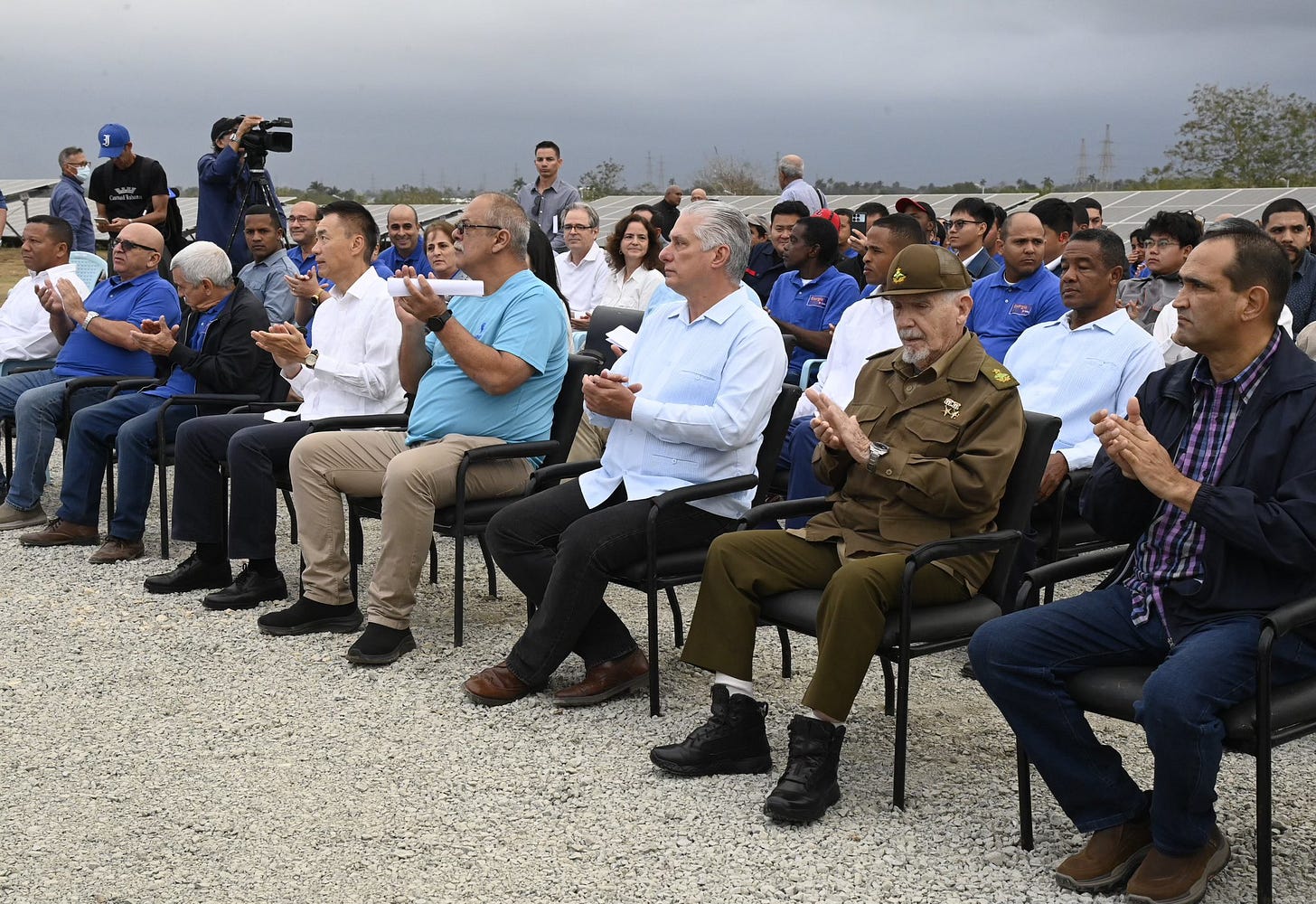
In February 2025, Cuba opened a solar park in Cotorro attended by the Chinese Ambassador and Cuban President Miguel Díaz-Canel. Since then, eight more solar parks have come online, producing 400 MW. China and Cuba have plans to modernize Cuba’s electrical grid with 55 solar parks to be built by the end of 2025.
Cuba has faced severe energy shortages in recent years because of deferred maintenance on its antiquated infrastructure.
Additional Reading(s)
China is Quietly Supplanting Russia as Cuba’s Main Benefactor (Reuters, 30 Jun 2025)
Our Men in Havana – Sergei Lavrov and Boris Titov (14 Apr 2024)
Cuban Government’s 55 Solar Parks Plan (Havana Times, 05 Mar 2025)
Russian Minister’s Suicide
Roman Starovoyt, the former head of Russia’s Transport Ministry, was found dead near his home after reportedly taking his own life following his dismissal by President Vladimir Putin.

According to VCHK-OGPU, a Telegram channel with ties to Russian security services, Starovoyt — who was the governor of Kursk from 2019 to 2024 — was facing imminent embezzlement charges of approximately 15 billion rubles (€162 million) related to contracts for constructing fortifications along the Kursk border with Ukraine.
It is worth noting that Russian billionaire Arkady Rotenberg, a childhood friend of Putin, was Starovoyt’s patron. Starovoyt’s is sending shockwaves of insecurity through the government elite. Has the war changed the unspoken rules of government corruption, and if Rotenberg cannot protect you, who can—God?
Putin did not attend the memorial service, as Kremlin spokesperson Dmitry Peskov told reporters, he had “other things on his work schedule.”
Additional Reading(s)
Sacked Russian Minister Commits Suicide (Novaya Gazeta 07 Jun 2025)
Russia Orders Closure of Kaliningrad Consulate
Russia had ordered the closure of Poland’s consulate in the western city of Kaliningrad in retaliation for what it called the “unjustified and hostile” shutdown of the Russian consulate in the Kraków (Poland).
The Foreign Ministry had summoned the Polish charge d’affaires to notify him that Moscow will revoke its consent for the Polish Consulate General in Kaliningrad to operate, effective 29 Aug 2025. Russia’s consulate in Kraków ceased operations on 30 Jun 2025.
Tensions between Russia and Poland have worsened since Moscow launched its full-scale invasion of Ukraine in February 2022. Poland has also been a key transit hub for Western military aid to Ukraine. In 2023, Warsaw imposed restrictions on Russian diplomats over accusations that Moscow is waging a “hybrid war” against the country.
Additional Reading(s)
Russia closing Polish consulate in Kaliningrad in tit-for-tat move (Al Jazeera 11 Jul 2025)
Vol 3, No 29 - BWR 13.07.2025
Thank you for reading “Barbershop Whispers....Russia” written by Adam A Blanco! “Barbershop Whispers…Russia” is a product of e8Q Technologies, a consultancy with insights on all things Eurasia. Subscribe for free to receive new posts.






